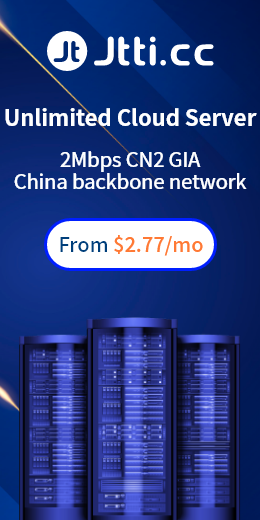In all industries, innovation and the ability to adapt quickly to change are key. For example, in the automotive and manufacturing sectors, continuous innovation and adaptation to change can meet the increasingly rapid growth of development needs.
This is also the meaning of the "hybrid cloud +" innovation model. Hybrid cloud combines the benefits of on-premises and cloud solutions to create a resilient, flexible, and powerful IT infrastructure. Cloud computing is expanding rapidly, but local infrastructure remains critical, especially in industries such as automotive, where hybrid cloud is urgently needed to remain competitive and foster innovation.
Jtti insists on providing users with high-quality cloud service solutions to ensure that users' critical applications can run with minimum latency and ensure compliance with sensitive data. Help you improve performance through cloud scalability and innovation.
Warner Cloud insists on providing users with high-quality cloud service solutions to ensure that users' critical applications can run with minimum latency and ensure compliance with sensitive data. Help you improve performance through cloud scalability and innovation.
In the automotive industry, use cloud and on-premises solutions to store sensitive data, such as vehicle design, on servers and keep intellectual property within the organization, ensuring control over data location and access. Easily integrate existing systems and save investment in proprietary hardware or software.
For low-latency applications, on-premises solutions are critical to ensure optimal user server performance during sensitive operational periods.
Hybrid cloud services provide scalability, allowing organizations to quickly adapt resources to demand without significant equipment hardware costs and long procurement cycles, while enabling flexibility through a wide range of services and tools to facilitate rapid deployment and innovation. As cloud services continue to evolve, hybrid clouds can also dynamically allocate resources to handle more workloads. Involving efficient data management, data can be intelligently cached, ensuring that the necessary data is securely stored in the cloud. You can reduce the need to replicate complete data, and by maintaining seamless data flow, you don't place a big burden on your internal infrastructure.
In automotive and manufacturing, the application of hybrid cloud is enabling innovative change. High performance computing and computer aided engineering simulation. Engineers push data from the cloud repository locally, avoiding delays during testing.
Self-driving technology requires hybrid models. The data pipeline goes from edge computing to core to the cloud. Need to support on-premises HPC as well as cloud-based HPC, with flexibility to customize solutions based on contracts, existing technologies and specific requirements. Processing large amounts of data, performing real-time analytics, and maintaining a high level of capability are all important for autonomous driving system development and deployment.
Track teams, high-performance teams apply hybrid cloud every day to make advanced decisions. Minimizing the need to transport heavy IT hardware around the world to balance costs and reduce environmental harm. Data can also be accessed and analyzed in real time to quickly make the right decisions.
The combination of on-premises and cloud environments enables tremendous flexibility, efficiency and innovation.

 EN
EN
 CN
CN









